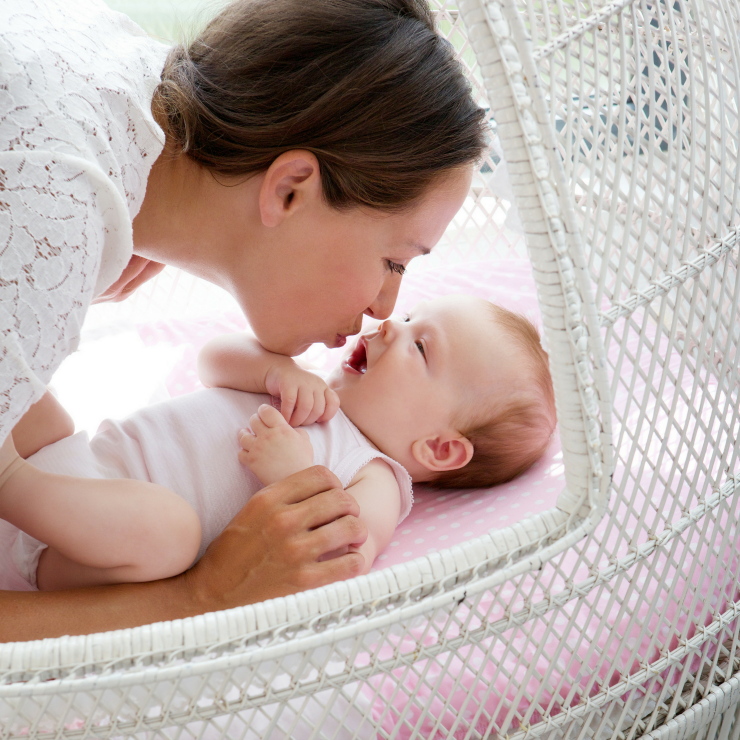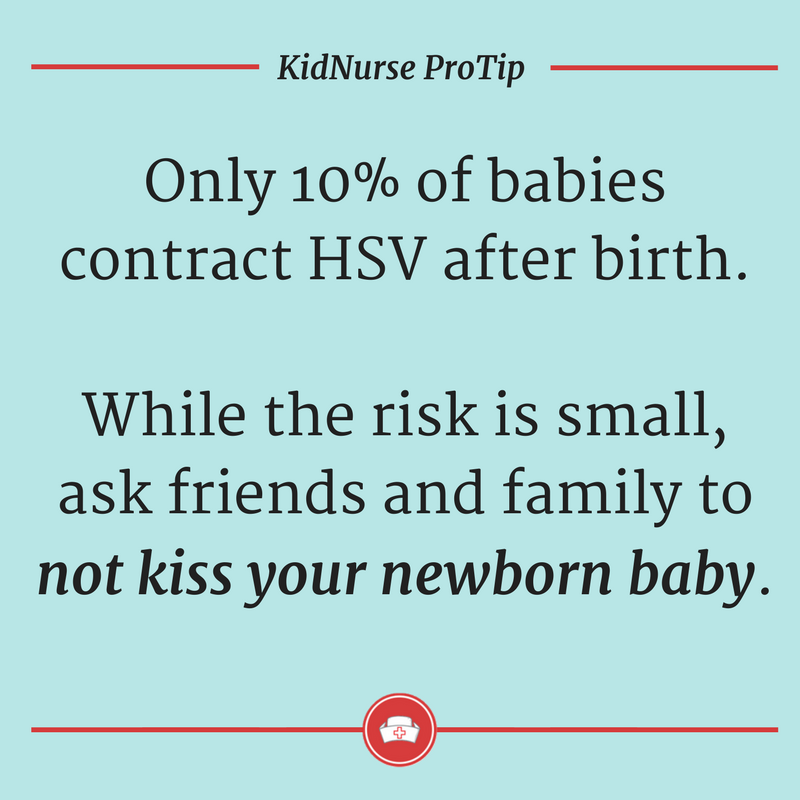Kisses That Kill … What’s A Parent To Do?
July 28, 2017
- 3.9K
- 3.9Kshares
No one likes kissing babies more than I do. One look at their adorable chubby cheeks and you just have to feel they are begging to be kissed and cuddled. In the past week, the “should you kiss your infant” debate has re-emerged after the death of 18 day old Mariana Sifrit. This baby girl contracted viral meningitis caused by HSV type 1 when she was less than a week old.
This is a tragedy, and my heart breaks for this family. No parents should have to bury their child. Mariana died from Herpes Simplex Virus type 1 that spread to her brain and caused encephalitis. HSV type 1 is known commonly for causing cold sores (although this virus can cause sores in any part of the body). After both of Mariana’s parents tested negative for HSV type 1, it has been assumed that she likely contracted this virus from someone else. This means a kiss from a well-wisher might have transferred this deadly virus to baby Mariana.

The Risks Of Kissing Babies
After this story received a huge amount of publicity, I received this email from a reader, and I know it has been on the minds of many other parents as well:
“I have a personal question and maybe you can address this concern publicly. The articles that are about cold sores killing babies. I unfortunately (along with millions of others) get these awful sores on my lip occasionally. I am very careful, but is it true that it can cause death? It makes me want to lock myself away if I have an outbreak, just the thought of causing harm to others. They are awful enough as it is, now I feel it’s even more terrible. How can we best protect our families and others? Ps. I hate the word herpes!!”
Cold Sores, HSV type 1, & HSV type 2?
Cold sores, also known as fever blisters, are small, annoying blisters that form around the lips and mouth. They are caused by HSV type 1 and they are extremely common. For about 1-2 weeks the blisters start to ooze, crust, then finally heal. Some studies suggest that by adolescence, 62% of Americans are infected with HSV type 1, and by the time people are in their 60s, up to 85% have been infected. This means that everyone is at risk for contracting HSV type 1. In fact, most people are exposed to HSV type 1 between 1 to 5 years of age.
While cold sores are nothing more than frustrating to children and adults, they can be dangerous to young infants. As in Mariana’s case, the virus can become fatal by spreading to the brain and causing encephalitis. HSV can also spread to the eyes and cause HSV keratitis, which can result in blindness. In young infants, we call this neonatal herpetic infections.
Important: HSV type 1 is a different strain than HSV type 2, which is more commonly known as genital herpes. Again, both viruses can cause sores anywhere on the body, but HSV type 1 is primarily responsible for cold sores and HSV type 2 usually causes genital sores. HSV type 1 is much more common than HSV type 2. If young infants are exposed to either strain, it can present a risk to their health.
What is the true risk of HSV type 1 For Babies?
We live in an age of parenting where the list of things NOT to do to your child is ever-growing. While I’m not a parent yet, I’ve devoted my profession to caring for children, and it’s intimidating to even me sometimes. This week, I learned that tickling your baby has even recently come into question by some… Huh? Interesting… but what is a parent to do with the influx of never-ending (and regularly contradicting) dos and don’ts?
We read stories like the death of Mariana, and the almost immediate response is an ultimatum to stop everyone from kissing babies.
However, I also read a study recently that found that parents who lick off infant’s pacifiers to clean them resulted in children who were significantly less likely to develop eczema and allergies (not gonna lie… thinking about that still makes me a little gaggy).
Furthermore, we know all children, from the time they are born, need physical affection. We begin with skin-to-skin contact the minute we welcome them into the world because of the profound beneficial effect physical contact has on a child’s overall wellbeing.
So where does that leave us with kissing babies?
To kiss or not to kiss? Should we only allow kisses at a certain age? Or what about just kissing babies on the forehead?
While the answers to those questions are truly a personal decision all parents have to make for their own families, based on the statistics that we know, let me put the risk of transmitting herpetic infections to our babies via kissing into perspective.
Unfortunately, neonatal herpetic infections are not a nationally reportable disease, so the incidence of these infections vary greatly. We do know that the estimated rate of occurrence ranges between 1 in 3,200 births to 1 in 20,000 births.
For a simple numerical comparison, here are some birth defects that are far more common than neonatal HSV:
- Spina bifida: 1 in 2,858 births
- Cerebral Palsy: 1.5 to more than 4 per 1,000 live births
- Cleft lip with or without cleft palate: 1 in 940 births
- Trisomy 21 (Down syndrome): 1 in 691 births
Those occurrence numbers (1 in 3,200 births to 1 in 20,000 births) are for herpetic infections caused by both HSV type 1 AND HSV type 2.
This is important to note because HSV type 2 is far more often the culprit for neonatal herpes infections. HSV type 2 infections are generally more serious as well. 70–85% of neonatal HSV infections are caused by HSV type 2, whereas the remaining cases are due to HSV type 1.
Then we have to address the question of transmission. Who gave the infant HSV type 1? How many deadly kisses are going around? It is a myth that HSV type 1 infections are usually acquired from non-maternal sources (aka infectious kisses from friends and extended family). Mother-to-child transmission of herpetic infections occur in utero (during pregnancy) 5% of the time, during the peripartum period (during delivery) 85% of the time, or postnatally (after birth) 10% of the time.
Understanding those numbers would tell us that 90% of the time, neonatal HSV infections come from mom and are most commonly transmitted during delivery.
To recap the numbers:
- Somewhere between 1 in 3,200 babies to 1 in 20,000 babies develop a neonatal herpes infection. Of that, somewhere between 15-30% are caused HSV type 1.
- Of all these neonatal herpetic infections, only 10% of infected babies contracted HSV after birth.
Trust me, I’m no math expert, but those numbers tell me that the risk of deadly herpetic kisses is actually relatively small.
To Kiss Or Not To Kiss?

Speaking ideally, it is best to ask your friends and family to not kiss your baby, especially under the age of 2 months while their immune system is immature and still developing.
But speaking logistically, I’m honestly not sure the best way a parent is supposed to stop someone from kissing babies. I know there are a variety of opinions out there on this topic (with some people feeling more strongly than others), but this is mine…
Physical affection from excited family and friends around your baby is a natural, well-intentioned response. Kissing a baby happens so fast, you likely won’t have a chance to ask your family and friends NOT to do it before you realized it happened. To me, it’s very similar to being pregnant, and suddenly an overly-excited well-wisher starts touching your belly and congratulating you. Should they do it? No, probably not. Does it still happen? Yes. Do they mean well? I’m sure. If a family member or friend kisses your baby, I think a similar logic applies.
You can always ask people not to kiss your newborn, but it can be really hard to control people’s loving response to your child. It’s certainly not impossible, but it’s likely challenging to work through. If someone kisses your baby without permission, it’s not worth losing sleep at night. The risk of contracting neonatal herpes truly is low.
Family and friends, to lessen the worries of new parents who have just welcomed a baby, please do not kiss them without permission, especially when the baby is under the age of 2 months. We all want to give our babies the best ability to develop their immune systems and limit as many germs during this time as we can. Trying to protect your children is just as natural as being excited and wanting to give them physical affection.
If you know you have a history of getting cold sores, please proceed with caution around newborns. Don’t kiss other people’s children. Be careful with your own babies, too. Remember, HSV type 1 can be contagious before a cold sore actually appears. Do not think it’s fine to kiss an infant just because you don’t have an active cold sore.
What else can we do to protect babies from HSV?
Unfortunately, parents themselves pose the greatest risk for transmitting HSV infections to our babies. If you know you have HSV, please talk to your OB/GYN about it. They will absolutely help you determine the best way to keep you and your baby safe. If you are pregnant, or trying to become pregnant, and you haven’t been tested for HSV, today is a good day to get tested (even if you think you aren’t at risk).
After your baby is born, make sure all visitors wash their hands before holding your new baby or touching their blanket or toys.
If your infant under the age of 2 months develops a fever, it is extremely important to take them to the ER. Often times, neonatal HSV presents with fever and lethargy. Most infants do not present with a classic facial rash we can easily identify as a cold sore.
Deciding whether or not you will allow other people to kiss your baby is an extremely personal decision you will have to make as parents. There really is no specific one right answer on the topic of kissing babies. I can reassure you, though, that the risk of deadly kisses threatening our babies, while tragic when they strike, is very small.
Author: Dani Stringer, MSN, CPNP, PMHS – founder of KidNurse and MomNurse Academy
- 3.9K
- 3.9Kshares